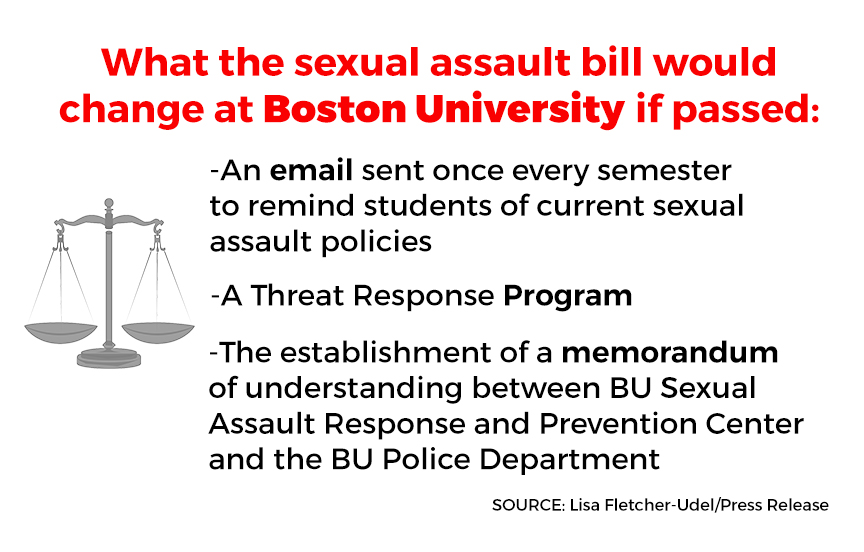
New legislation recently brought up at the Massachusetts State House by Rep. Tricia Farley-Bouvier would provide more guidance and preventive regulations to combat sexual assault on college campuses. Boston University has already conformed to some of the proposed regulations, but would require several changes in order to be fully compliant if the bill passes.
Several proposed policies in the bill that BU would have to implement include an email that would be sent to students once every semester as a reminder of current sexual assault policies, a Threat Response Program and the establishment of a memorandum of understanding between the BU Sexual Assault Response and Prevention Center and the Boston University Police Department.
Bouvier said the bill has an “excellent chance” of passing once it has passed the committee. She said a committee hearing of the bill had been done in June and will require a committee voting before it is taken to the floor of the House.
“The leadership in the Senate and the House care completely about these issues and want to take some action to ensure the safety of college students in Massachusetts,” Bouvier said. “The goal is to make [campuses] a safer place and to change the culture of rape on our campuses. I don’t think that is going to happen all of a sudden, but I think we need to take bold actions to ensure that all of our campuses are safe.”
One of the initiatives included provisions to make campus sexual assault data more readily accessible, similar to how the 1990 federal Clery Act required colleges and universities who draw from federal financial aid to disclose crime data. Bouvier said, however, that with this legislation, she would like to make the records and data of Massachusetts’ schools more consumer-friendly than the Clery Act did.
“You wouldn’t really have a good sense about how safe your school is or not [based on statistics from the Clery Act]. It would be too hard to tell because the data is sort of isolated from one school to another,” she said. “What I would like to get to eventually is that [data] should be something that consumers of colleges, they should be able to get information about how their colleges are addressing this issue.”
Having offered testimony about the legislation, President of the Association of Independent Colleges and Universities in Massachusetts Richard Doherty said the new regulations are unnecessary “at this time” because of “brand new, very extensive” federal regulations focusing on violence against women as of July 1.
“I don’t think that a new set of state regulations would really help things and it really does run the risk of confusing and or contradicting what may exist at the federal level,” he said. “It is important that there be some sort of uniformity in the training and application [between federal and state laws] of what schools are doing today.”
Maureen Mahoney, the director of SARP, said she is also not sure the bill would help stem rape culture on campuses.
“As an advocate for victim/survivors of sexual assault I do not think the bill adds anything to victim/survivor rights,” Mahoney said in an email, “and in fact looking at the bill in its entirety it seems as if it may take away some choices from victim/survivors.”
Mahoney said she is not sure what is meant by a Threat Response Program, citing BU’s current Emergency Alert System.
BU spokesman Colin Riley declined to comment on the issue.
Several students said despite the additional policies included in the bill, BU still needs to take additional measures to reassure the legislation’s execution and the community’s safety.
Gabriel King Houis, a sophomore in the College of Fine Arts, said BU and SARP do a good job of working with freshmen on the subject of sexual assault, but more could be done periodically.
“There probably should be more done. As long as there are still issues with it, there is always more you can do,” he said. “There are definitely problems with things that go down at frat parties.”
Kiara Connell, a freshman in the College of Arts and Sciences, said that the initiatives would benefit BU by creating a more open atmosphere for conversations on sexual assault and misconduct.
“By the sound of [the bill], it would make us a lot more open,” she said. “From what I have heard about victims of sexual abuse and things of that nature, it is really a shy topic and no one ever really wants to talk about what they have experienced and that puts people in a pretty dark place, but these would help people feel more comfortable.”
Melanie Kirsh, a senior in CAS, said the proposed legislation is needed, but she would like to see more funding assistance for crisis centers on campus as well.
“The bills and initiatives presented focus too much on law enforcement, which is unlikely to be a supportive reporting authority. Crisis centers, like SARP at BU, have very little funding to serve all students in need of crisis counseling or guidance,” she said. “There also should be more initiatives to ensure survivors’ safety needs are met, which may involve expelling [assailants], assisting with housing concerns and installing blue lights in more off-campus locations.”




















































































































